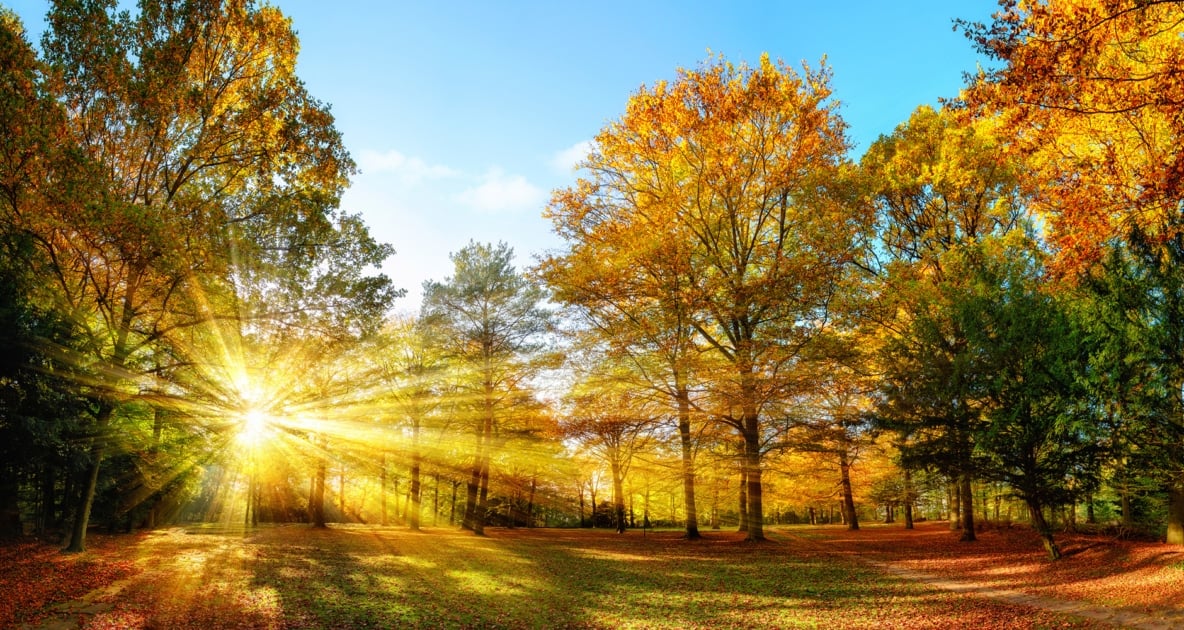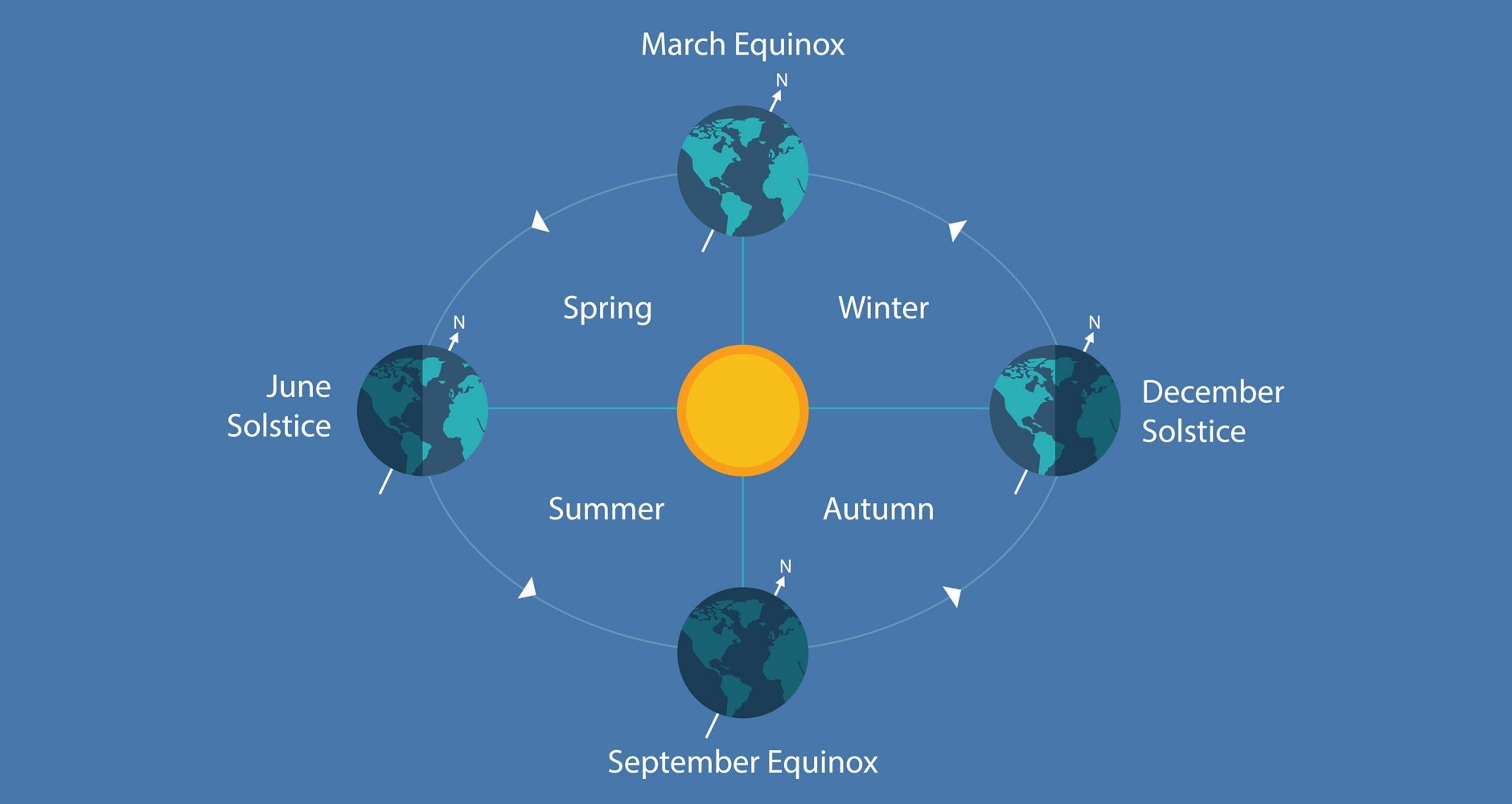What Is Meteorological Fall?
According to our calendars, we still have a few weeks of summer left to enjoy. But in meteorological circles, fall begins September 1st. Why are there two dates? We explain.

September is here! And according to the calendar and the Farmers’ Almanac, we still have a few weeks of summer left to enjoy, as fall doesn’t officially start until mid-September with the arrival of the autumnal equinox. But in meteorological circles, September 1st marks the first day of fall. So why the difference?
What’s the difference between “meteorological fall” and “astronomical fall”?
Meteorologists divide the year up into seasons a bit differently than our calendars do. According to the meteorological calendar, the 4 seasons occur as follows:
Meteorological Seasons:
- Fall – Begins September 1 (September, October, November); ends November 30
- Winter – Begins December 1 (December, January, February); ends on the last day in February
- Spring – Begins March 1 (March, April, May); ends May 31
- Summer – Begins June 1 (June, July, August); ends August 31
The reason is that meteorological seasons are based on the annual temperature cycle. So, summer, for example, would run June through August, which makes perfect sense. Those are the months we most associate with “summer” and “summer temperatures.” Astronomers, on the other hand, determine the seasons by the Earth’s tilt. While it may seem that the seasons are caused by Earth’s changing distance from the Sun, it’s really due to the tilt of the Earth’s axis. This tilt—a 23-degree slant—enables the Sun to appear above the horizon for different lengths of time during the various seasons. The tilt determines whether the Sun’s rays strike at a low angle or more directly onto Earth.
Astronomical Seasons:
- Fall begins with the autumnal equinox. At this point, the Earth’s tilt is moving away from its maximum lean toward the Sun; its rays are aiming directly at the equator.
- Winter begins with the winter solstice. The Earth tilts away from the Sun, and the Sun’s rays are aiming directly at southern latitudes.
- Spring begins with the vernal equinox. At this point, the Earth moves from its maximum lean away from the Sun to a point that’s equal distance from the Sun; the Sun’s rays are aiming directly at the equator.
- Summer begins with the summer solstice. The Earth is tilting its farthest toward the Sun, and its rays are aiming directly at northern latitudes.
In short, the fall you are familiar with, which starts on the date of the autumnal equinox as listed on your calendar, is “astronomical.” But for some, fall starts September 1.
Ready for autumn? Check out our peak Fall Foliage Dates here.
What do you think: would you rather follow the meteorological seasons, with fall starting September 1? Share your thoughts in the comments below!

Caleb Weatherbee
Caleb Weatherbee is the official forecaster for the Farmers' Almanac. His name is actually a pseudonym that has been passed down through generations of Almanac prognosticators and has been used to conceal the true identity of the men and women behind our predictions.







Some cultures believed the equinoxes and solstices were the middle of their respective seasons instead of the beginning. In Celtic circles, summer began on May 1, Beltaine, where winter began on November 1, Samhuinn. This is why summer solstice is also called and celebrated as midsummer in Scandinavia and other places.
And by the way m, the spices we use to make peach cobbler are the same ones we use to make pumpkin pie. I’ll enjoy my spices no matter what time of year it is. 😜
This is great information! Thank you for sharing.
The fall I like is the astronomicsl
fall…when the
fall begins in the middle of Sept. Right now it is too hot to think of pumpkin spice latte,creamer . etc.it just seems logical this way….
I used to go with the astrological seasons, but that never left enough time to enjoy fall things and the spooky season before the festive Christmas/ holiday season kicked in 11/1. I still recognize the equinox, Thanksgiving, and the solstice, but now I go off the meteorological calendar enjoying autumn things 9/1-10/31 and Yuletide things 11/1-12/31. Two full months for both! Cheers fall is almost here! ? ? ☃️ ?
It used to be that meteorologists stuck to the True/astronomically based seasons. But, for the purposes of data consistency they moved to fixed dates. This actually has nothing to do with the temperature cycle. In point of fact, it would be necessary to extend past the astronomical based dates due to the lag in the temperature cycle. So, for example, a true meteorologically based fall would occur nearer the end of September. And, of course, most of us know that this tends to be true.
In northern Idaho Fall lasts for a month or two and generally starts in late September. Winter lasts for 5-6 months and generally starts in mid-October. But, most of us stick to the astronomical designations because those are the closest guide to planting/harvesting.
Going by meteorological seasons may seem easier, but I prefer to go by astronomical seasons. I live in Virginia, and since the beginning of meteorological fall this year, it has still been hot enough to go swimming outdoors. The temperature is supposed to go up to the 90s this week, and I can’t associate heat with fall. I associate fall with the leaves changing colors and a cool breeze.
I would rather follow the meteorological seasons, with fall starting September 1. I can see the temperature gradually drops from 100 degrees to 90 degrees during the third week of August and begin to feel fall like weather in the first week of September instead of third week of astronomical autumn.
It would be much easier, wouldn’t it?
Meterological seasons align with the Essenes calendar, and with this calendar, they were able to predict when the ages over 6,000 years would occur, when Jesus would be born, when He would die, when we would see Him again (2032 AD, exactly 2,000 years after He was crucified in 32 AD, which is the Church, or Age of Grace, where we can enter into God Most High’s presence, through His Only Begotten Son, Jesus Christ), when the Great Tribulation Age would begin (2025 AD). They have been able to predict everything, and had 100% accuracy, some 200 years before Jesus appeared.
The astronomical seasons are the ones that the Talmud rabbic calendar is established on, and this is why there is much confusion as to when the Lord’s Feast Days occur. With the Essenes calendar, there is no confusion.
Saving this. Wonder if it will pan out?
Well,meteorological seasons are a man-made event where as astronomical seasons are based in fact. Since September will arrive in the 90’s, I will stick with astronomical. I only wish fall would start soon, with cooler temps! Summer is just sweat and bug bites.
My Open Windows Devotional uses Metereological Seasons. So I stick with that.
I’ve only heard of the astronomical times. What is the reason for the meteorological times?
Hi b, it’s because the astronomical seasons are based on the position of Earth in relation to the Sun, whereas the meteorological seasons are based on the annual temperature cycle, which meteorologists closely follow.